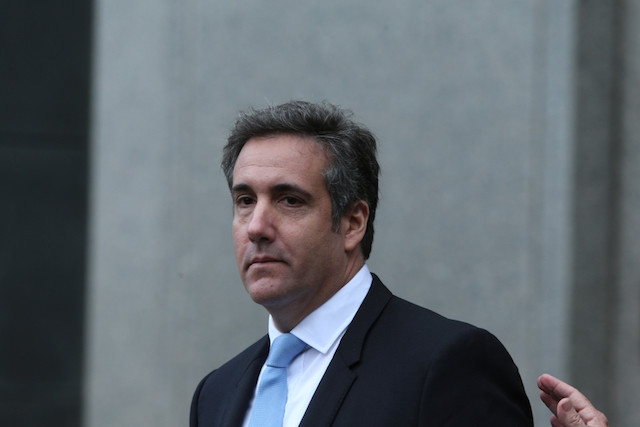Donald Trump’s longtime lawyer and fixer has pleaded guilty to lying to congressional investigations into possible connections between the Trump campaign and Russia, and admitted that he had been involved in talks to build a Trump Tower in Moscow months into the 2016 US presidential campaign.
In Michael Cohen’s explosive testimony in Manhattan federal court on Thursday, he admitted he had been in contact with a Kremlin official in 2016, and had lied to be consistent with Trump’s “political messaging” and “to be loyal”.
Here are the key takeaways from the latest bombshell moment in Robert Mueller’s investigation:
The Kremlin contact
Cohen admitted that he spoke to a Kremlin official during the US presidential election in 2016 to try to land Russian government support for a project to construct a Trump building in Moscow.
Court papers said “Russian Official 1, the Press Secretary for the President of Russia,” did respond to Cohen’s inquiries about Trump Tower Moscow. (This official is reportedly Dmitry Peskov.)
Cohen even had a 20-minute phone conversation with this official’s assistant, in which he “described his position at the company and outlined the proposed Moscow Project”.
One day after this call, Moscow-born businessman Felix Sater, referred to as “Individual 2” in court papers asked Cohen to talk, writing “It’s about [the President of Russia] they called today.”
The Moscow project did not end in January 2016
Cohen had falsely claimed in his testimony before Congress in 2017 that the Moscow project came to an end in January 2016, and was not discussed at length with other Trump Organization officials.
It was actually discussed “multiple times” within the Trump Organization, and these discussions carried on into June 2016, less than six months before the election.
“Cohen discussed the status and progress of the Moscow Project with [Trump] on more than the three occasions Cohen claimed to the Committee, and he briefed family members of [Trump] within the Company about the project,” according to the charging document.
Cohen’s statements contradict Trump’s account
During and after the presidential campaign, Trump insisted that he did not have business dealings in Russia.
On Thursday, Trump called Cohen “a weak person” and said he
“is lying and he’s trying to get a reduced sentence”.
Cohen and Trump’s potential trip to Russia
Cohen admitted he lied when he told Congress he never agreed to travel to Russia for the project, and falsely claimed that he “never considered” asking Trump to travel to Russia in 2016.
Cohen did agree to travel to Russia in connection with the Trump Tower Moscow project “and took steps in contemplation of [Trump’s] possible travel to Russia”, according to court papers. Cohen even asked Trump about his potentially going there and “asked a senior campaign official about potential business travel to Russia”.
Lies to be consistent with Trump’s messaging
Cohen admitted he lied to Congress about the extent of Trump’s involvement with the project in an attempt to hinder the Trump-Russia investigation and to protect Trump.
“In truth and in fact, and as Cohen well knew, Cohen’s representations about the Moscow Project he made to [Congress] were false and misleading,” prosecutors said in the nine-page document.
“Cohen made the false statements to (1) minimize links between the Moscow Project and [Trump] and (2) give the false impression that the Moscow Project ended before the Iowa caucus and ‘the very first primary,’ in hopes of limiting the ongoing Russia investigations.”
Cohen said he lied to “be loyal” to Trump and consistent with Trump’s “political messaging”.
Nothing said in court, or in associated court filings, addressed whether Trump or his aides had directed Cohen to mislead Congress.
